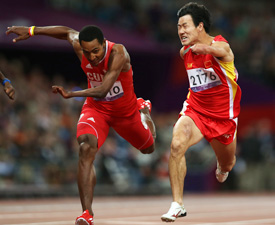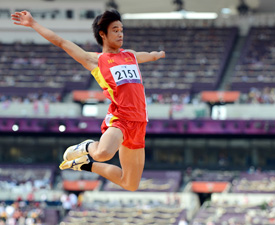|
 |
 |
|
FIERCE COMPETITION: Chinese runner Zhao Xu (right) sprints in the men's 100-meter-T46 at the London Paralympic Games on September 6, 2012. Xu won the gold medal in this event (WANG LILI) |
GREAT LEAP: Liu Fuliang competes in the men's F46 long jump at the London Paralympic Games on September 2, 2012. He won the gold medal with a 7.15-meter jump, breaking the Paralympic record (ZHANG JINJIA) |
The 282 athletes who participated in the London Paralympics come from 29 provinces, autonomous regions and municipalities. Statistics from CDPF indicate that currently there are more than 2.7 million disabled athletes in China and 6 million disabled people who regularly partake in sports. Disabled athletes train in hundreds of facilities across China in preparation for a variety of competitions.
Chinese Paralympic athletes have also hit tough times. Although Ping was awarded an apartment of 50 square meters for winning China's first-ever Paralympic gold medal, she struggled for more than 10 years trying to secure the property rights. After the Paralympics, Ping was "laid off."
"I was at a loss at that time. In order to make a living, I learned massage. Sports had improved my ability to endure hardships. I would always invent new ways of massage to attract more customers. Now I have a chain of massage parlors which employ disabled people."
Most disabled Chinese aren't nearly as respected as their Paralympic counterparts. They live in the bottom rungs of society, estranged and despised by ordinary folk. Many are forced into begging on the roadside or on the subway, living on the sympathy of others.
At the beginning of 2010, the Guidelines on Accelerating the Construction of the Social Security and Social Services System for People With a Disability was released. It stated—among other things—that by 2020 the disabled should enjoy basic public and rehabilitation services and that the level of social security for disabled people will greatly improve.
Jia Yong, deputy head of the Chinese Paralympic delegation and Vice President of CDPF said, "Our federation is taking measures to shorten the distance between the sports service system for disabled people and that for healthy people and at the same time to make disabled people benefit from the sports service system for healthy people."
In order to provide more guidance for the disabled, BDPF has organized several sessions to train 334 sports coaches for the disabled. In five years, it will train 30,000 sports coaches to guide and organize disabled people to do sports.
CDPF also plans to build 1,200 exemplary sports centers for the disabled in five years to promote sports and physical activity.
New Hope Center
At the London 2012 Paralympic Games, the three Beijing Paralympic table tennis champions Feng Panfeng, Liu Jing and Zhou Ying successfully defended their title at the competitions. All of them hail from Pizhou City of Jiangsu Province. Furthermore, they were all patients at the New Hope Center, a polio rehabilitation center which offers academic and sports training.
The New Hope Center was co-funded by the Norwegian Missionary Alliance and China's Amity Foundation. It was officially established in 1995, six years after the outbreak of a polio epidemic that shocked the whole country.
The center first established a table tennis team in 2001 to encourage children to exercise and have fun, but the team did far more than simply playing for their own amusement.
The team has won dozens of gold medals at various sporting events for the disabled both at home and abroad. At the 2008 Beijing Paraplympic Games, athletes from the center won eight gold medals in table tennis and in London they won four.
"The children study for three hours in the morning and take table tennis training for three hours in the afternoon," said Guo Zhen, who runs the center. "Their hard effort has proved rewarding."
The 590 children with polio have all graduated from the center. Ninety-six of them have entered university to further their education.
Now the center has shifted its focus from a shelter to a center focused on rehabilitation and selecting children with a talent for sports.
Email us at: tangyuankai@bjreview.com | 